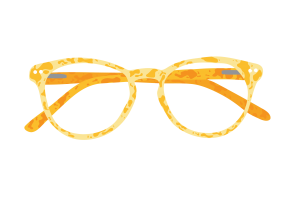Some of the key words used in this module are explained below. You can print these for quick reference:
Astigmatism
People with astigmatism have difficulty seeing clearly in the distance and close up.
Braille
A form of written language for blind people. Letters are represented by patterns of raised dots. These dots are felt with the fingertips.
Hyperopia
Hyperopia can also be called far-sightedness. People with hyperopia can see objects in the distance clearly. However, they find it hard to focus on close objects.
Myopia
Myopia can also be called near-sightedness. People with myopia can see close objects clearly. However, more distant objects are blurry.
Presbyopia
Presbyopia happens to many people as they age. People with presbyopia find it harder to see things up close. For example, activities such as reading and sewing become harder.
Prescription Glasses
Glasses that have been matched to the person wearing them after a thorough eye exam by a qualified eye health professional.
Refractive error
A common problem with vision, which is usually correctable with the right glasses or contact lenses. There are different types of refractive error including: astigmatism, hyperopia, myopia and presbyopia.
Vision
The ability to see.
Vision impairment
Vision impairment is a problem with seeing that cannot be treated or fully corrected by glasses or surgery. Vision impairment includes low vision and blindness.
If you find other words that you are not familiar with, ask a colleague, your supervisor, or post a question on the discussion forum.
